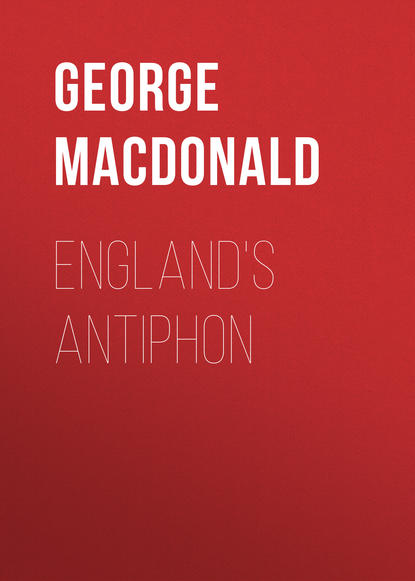 Полная версия
Полная версияEngland's Antiphon
116
Consort is the right word scientifically. It means the fitting together of sounds according to their nature. Concert, however, is not wrong. It is even more poetic than consort, for it means a striving together, which is the idea of all peace: the strife is together, and not of one against the other. All harmony is an ordered, a divine strife. In the contest of music, every tone restrains its foot and bows its head to the rest in holy dance.
117
Symphony is here used for chorus, and quite correctly; for symphony is a voicing together. To this symphony of the angels the spheres and the heavenly organ are the accompaniment.
118
Die of the music.
119
Not merely swings, but lashes about.
120
Full of folds or coils.
121
The legend concerning this cessation of the oracles associates it with the Crucifixion. Milton in The Nativity represents it as the consequence of the very presence of the infant Saviour. War and lying are banished together.
122
The genius is the local god, the god of the place as a place.
123
The Lars were the protecting spirits of the ancestors of the family; the Lemures were evil spirits, spectres, or bad ghosts. But the notions were somewhat indefinite.
124
Flamen was the word used for priest when the Romans spoke of the priest of any particular divinity. Hence the peculiar power in the last line of the stanza.
125
Jupiter Ammon, worshipped in Libya, in the north of Africa, under the form of a goat. "He draws in his horn."
126
The Syrian Adonis.
127
Frightful, horrible, as, a grisly bear.
128
Isis, Orus, Anubis, and Osiris, all Egyptian divinities—the last worshipped in the form of a bull.
129
No rain falls in Egypt.
130
Last-born: the star in the east.
131
Bright-armoured.
132
Ready for what service may arise.
133
The with we should now omit, for when we use it we mean the opposite of what is meant here.
134
It is the light of the soul going out from the eyes, as certainly as the light of the world coming in at the eyes that makes things seen.
135
The action by which a body attacked collects force by opposition.
136
Cut roughly through.
137
Intransitively used. They touch each other.
138
Self-desire, which is death's pit, &c.
139
Which understood.
140
How unpleasant conceit can become. The joy of seeing the Saviour was stolen because they gained it in the absence of the sun!
141
A trisyllable.
142
His garland.
143
The "sunny seed" in their hearts.
144
From tine or tind, to set on fire. Hence tinder.
145
The body of Jesus.
146
Mark i. 35; Luke xxi. 37. The word time must be associated both with progress and prayer—his walking-time and prayer-time.
147
This is an allusion to the sphere-music: the great heavens is a clock whose hours are those when Jesus retires to his Father; and to these hours the sphere-music gives the chime.
148
He continues his poetic synonyms for the night.
149
"Behold I stand at the door and knock."
150
A monosyllable.
151
Often used for chambers.
152
"The creation looks for the light, thy shadow?" Or, "The light looks for thy shadow, the sun"?
153
Perforce: of necessity.
154
He does not mean his fellows, but his bodily nature.
155
Savourest?
156
The first I ever saw of its hymns was on a broad-sheet of Christmas Carols, with coloured pictures, printed in Seven Dials.
157
They passed through twenty editions, not to mention one lately published (by Daniel Sedgwick, of 81, Sun-street, Bishopsgate, a man who, concerning hymns and their writers, knows more than any other man I have met), from which, carefully edited, I have gathered all my information, although I had known the book itself for many years.
158
The animal spirits of the old physiologists.
159
In the following five lines I have adopted the reading of the first edition, which, although a little florid, I prefer to the scanty two lines of the later.
160
False in feeling, nor like God at all, although a ready pagan representation of him. There is much of the pagan left in many Christians—poets too.
161
Insisting—persistent.
162
Great cloudy ridges, one rising above the other, like a grand stair up to the heavens. See Wordsworth's note.
163
The mountain.
164
These two lines are just the symbol for the life of their author.
165
From the rose-light on the snow of its peak.
166
They all flow from under the glaciers, fed by their constant melting.
167
Turning for contrast to the glaciers, which he apostrophizes in the next line.
168
Antecedent, peaks.

